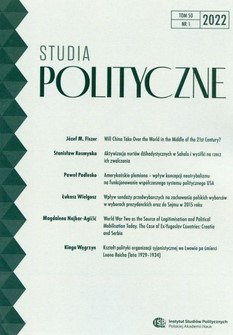World War Two as the Source of Legitimisation and Political Mobilisation Today The Case of Ex-Yugoslav Countries: Croatia and Serbia
World War Two as the Source of Legitimisation and Political Mobilisation Today The Case of Ex-Yugoslav Countries: Croatia and Serbia
Author(s): Magdalena Najbar-AgičićSubject(s): Military history, Political history, Government/Political systems, WW II and following years (1940 - 1949), Transformation Period (1990 - 2010), History of Communism, Politics of History/Memory, Peace and Conflict Studies
Published by: Instytut Studiów Politycznych PAN
Keywords: National Liberation Battle; Socialist Yugoslavia; ex-Yugoslav countries; politics of memory; legitimisation;
Summary/Abstract: Topics concerning the Second World War are widely present in the public spheres of ex-Yugoslav countries. Owing to the absence of democratic legitimization of the Yugoslav Communist Party’s government and Josip Broz Tito himself, the tale of the National Liberation Battle became the main legitimizing source of their regime and foundation myth of socialist Yugoslavia. Due to that, the partisan struggle from the time of the Second World War was in the limelight of propaganda during the communist regime, but at the same time the Communist Party kept the interpretive monopoly on it. Because this part of history has been turned into a myth and a free debate on the traumas of war has been impossible, the peoples of former Yugoslavia have failed to face and overcome a painful past. Nonetheless, nationalist narratives that saw their own nation as an exclusively innocent victim of others survived the socialist period. In this way, they greatly contributed to the new war of the 1990s.The situation in ex-Yugoslav countries is quite dynamic and complex, and each country has its specifics concerning the memory of WW2, while still it is the, or one of the, fundamental sources used for legitimization by groups aspiring for power and for the mobilization of their supporters everywhere.
Journal: Studia Polityczne
- Issue Year: 50/2022
- Issue No: 1
- Page Range: 111-124
- Page Count: 14
- Language: English

